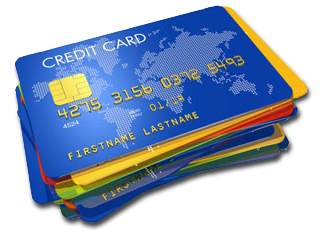Business Owners

The Importance of Business Credit
 Many small business owners utilize their corporate credit cards are their main financing source for business capital. Today, business credit is continually evaluated in conjuction with your personal credit on a daily basis by creditors and credit card companies. Your personal credit can be a major factor in obtaining and keeping credit to finance your business. In the past, business credit, “no-doc” loans and business credit cards were easy to obtain. Since 2009, this model has changed. Today, financing your business requires a daily comittment to keep your “Duns Paydex” score as high as possible. The following is an exerpt from the Small Business Administration website as it relates to credit and the improtance of those scores.
Many small business owners utilize their corporate credit cards are their main financing source for business capital. Today, business credit is continually evaluated in conjuction with your personal credit on a daily basis by creditors and credit card companies. Your personal credit can be a major factor in obtaining and keeping credit to finance your business. In the past, business credit, “no-doc” loans and business credit cards were easy to obtain. Since 2009, this model has changed. Today, financing your business requires a daily comittment to keep your “Duns Paydex” score as high as possible. The following is an exerpt from the Small Business Administration website as it relates to credit and the improtance of those scores.
Managing Your Business Credit
5 simple steps you should take to manage your business credit
1. Determine whether or not you already have a business credit file. Small business owners should first know if they have a business credit file with D&B. You can find this out by calling D&B Customer Service at 1-866-785-0430 or visitinghttp://iupdate.dnb.com/iUpdate/mainlaunchpage.htm.If you don’t have a business credit file, establish one by applying for a D-U-N-S® number. Small businesses should apply for a D-U-N-S® number, a unique business identification number, as soon as they start their enterprise to start the process of creating a business credit file. If, when you call or visit the D&B web site, you determine that you already have a business credit file, review it completely to understand what information it contains. Add or modify the information as necessary to ensure that those looking at your business credit (such as vendors, suppliers and financial institutions) are making decisions based on complete and accurate information.
2. Establish a business credit history. When they are starting up, many small businesses use their personal credit and finances to get their business going. But they should establish a credit history by putting expenses (such as a business phone line) in their business name and using a commercial bank account to pay their bills.
3. Pay bills on time – and understand other factors that influence your credit rating. In order to improve your commercial credit scores and build a positive payment history, the most important thing to do is pay your bills on time. Be very careful not to overextend your business, and use any line of credit judiciously. While payment behavior is important, credit ratings are based on multiple factors. D&B, for example, maintains 150 factors that go into a credit rating, such as industry, revenues and number of employees.
4. Monitor your business credit file and keep it up to date. According to D&B, the credit score of about one in three businesses declines over just a three-month period. By monitoring your business credit file, you will be aware of any change in your ratings before it affects your relationships with customers, suppliers and financial institutions. You should keep your credit file current and accurate, reflecting changes such as location, number of employees, outstanding suits/liens and revenue – all of which impact your credit rating
5. Monitor your customers’ and vendors’ credit. Monitoring credit reports that provide a clear and complete picture of the credit standing of your customers can help you to determine how much credit, and on what terms, you should extend.
Why small businesses should manage their business credit
Small business owners are entrepreneurs. They are successful because of their ideas, their passion, their drive. But they generally aren’t accountants, and as a result they are often unaware of just how important actively managing business credit is to their success. Small business owners agree that cash flow management is one of their top concerns. Actively managing their business credit can help small businesses ensure positive cash flow by:
- Securing more financing at better terms. Good credit can ensure that small businesses get financing when they need it. According to the SBA, insufficient or delayed financing is the second most common reason for business failure. And, since most loan decisions below $100k are automated, the business credit file will often dictate the amount and terms of a loan. For businesses with poor credit ratings, top national banks may increase credit card interest rates on average from 9% to 18% and loan interest rates on average from 8% to 12%.
- Ensuring you get needed supplies at affordable terms. Suppliers evaluate your credit and make decisions about how much credit to extend to you – perhaps a $30K credit line could have been $60K with a stronger business credit file. Good business credit can ensure that you get the supplies you need under the best possible terms, freeing up more money for your business.
- Making smarter credit decisions on your customers. Knowing the credit of customers enables small businesses to provide better terms to creditworthy customers and avoid doing business with customers who pay slowly – both of which can lead to improved cash flow.
- Protecting yourself against business identity theft. Actively managing your business credit file helps you ensure that fraudulent or incorrect information is not in the file. 15-30% of all commercial credit losses are due to fraudulent activity. It’s important that your business credit file truly reflects how good your credit is, and that you are aware of any inaccuracies and missing data so you can address them promptly.
FOR MORE INFORMATION, GO TO WWW.SBA.GOV.

 The key is your credit score.
The key is your credit score.
This site is dedicated to educating consumers and business owners on the changing lanscape of credit and provides many resources for financial success.
Please let us know if this site is helpful. Did you learn anything? Let us know what you learned or what interested you. Email your comments and suggestions.
